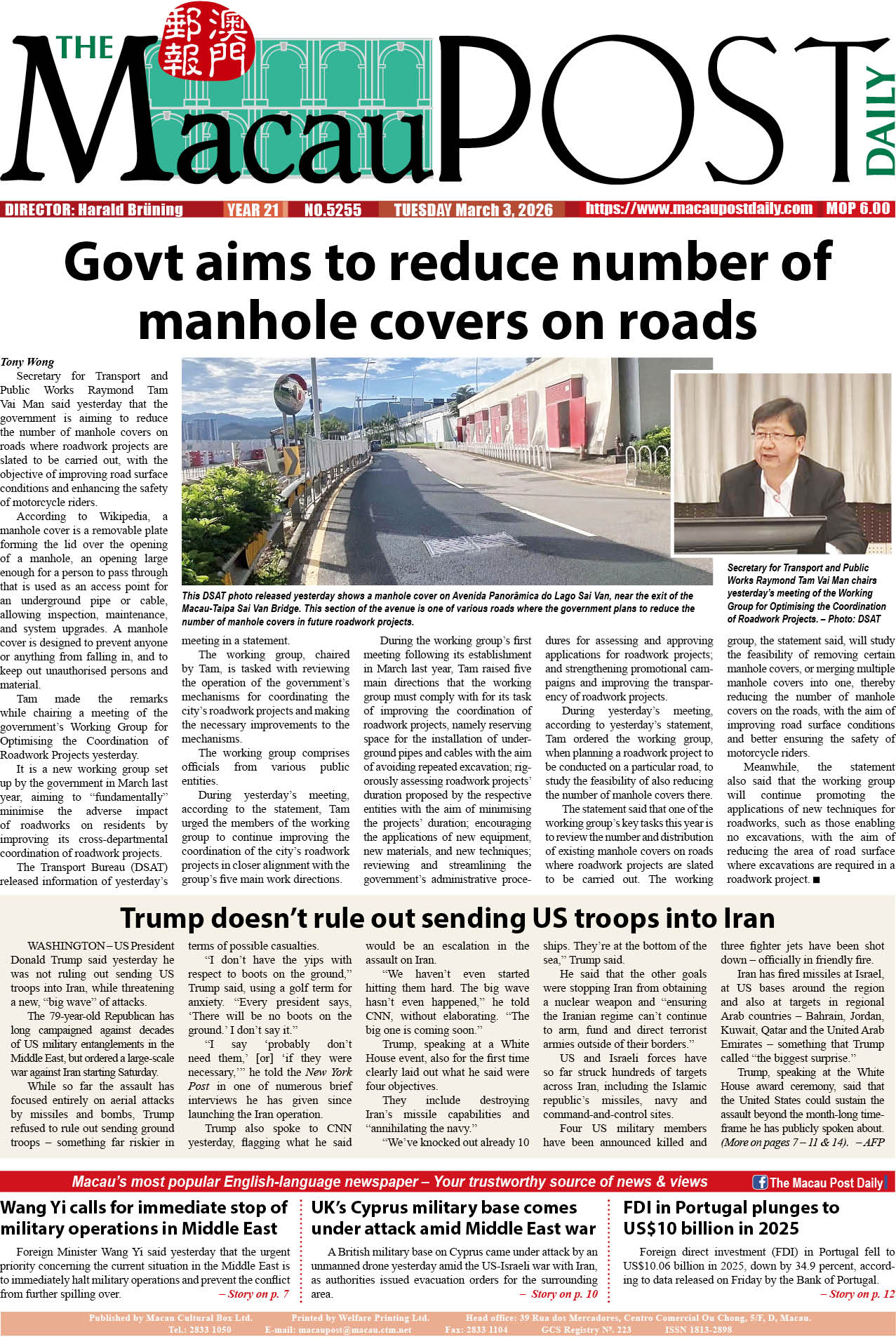Chief Executive Sam Hou Fai said yesterday that the closure of the city’s 11 satellite casinos “would not cause a large impact” on Macau’s gross domestic product (GDP) while also underlining that he is confident that the respective gaming concessionaires that formally own the satellite casinos will fulfil their promise to continue hiring all their local employees working there after the closure.
Sam made the remarks while speaking to reporters on the public University of Macau’s (UM) campus after attending the university’s honorary degree conferment ceremony yesterday.
The government announced last week that all 11 “satellite casinos” in Macau will close for good by December 31 this year.
The 11 satellite casinos comprise nine owned by SJM, one owned by Galaxy, and one owned by Melco, three of the city’s current six gaming concessionaires.
The so-called satellite casinos in Macau are formally owned by gaming concessionaires but are actually run by third parties as they are housed on premises that are not owned by the respective gaming concessionaires.
The satellite casinos are currently operated under partnership models where the respective gaming concessionaires and third parties share the revenues.
According to the gaming law’s newly amended version, all casinos must be housed in premises that are owned by their respective gaming concessionaires.
The new legislation amending the gaming law stipulates a three-year transition period, which started on January 1, 2023, during which existing satellite casinos can continue operating under their current partnership models.
After the three-year transition period, which is scheduled to end on December 31 this year, a satellite casino, which is housed on premises not owned by the respective gaming concessionaire, will have to be run by a “management company” to be hired by the gaming concessionaire. The management company will no longer be allowed to share the casino’s revenues with the respective gaming concessionaire, which, instead, can only pay the former a management fee.
According to last week’s government announcements, there are currently about 5,600 local employees working at the satellite casinos, of whom around 4,800 are directly employed by the respective gaming concessionaires, while around 800 are employed by the third-party operators.
Speaking to reporters yesterday, Sam underlined that the respective gaming operators, as announced by the government last week, have all promised to continue employing all the local employees working at the satellite casinos currently employed by them.
Concerning the other 800 local workers, Sam noted that according to the principle of the Labour Relations Law, the respective third-party operators will “have the responsibility” to continue employing the local employees currently working for them after the closure of the satellite casinos, such as by arranging for them to work at their other businesses.
The chief executive was quick to add that the respective gaming operators have promised the government that they will, if the respective third-party operators “eventually have difficulty in” hiring all their affected local workers after the closure of the satellite casinos, “help them secure employment”.
When asked by reporters about the extent to which the closure of the city’s satellite casinos would affect Macau’s GDP, Sam said that he “did not know much about details of the respective data” but he was quick to add that he has been aware of some analytical articles about Macau’s gaming industry recently published in Hong Kong, according to which, he said, Macau’s gross gaming revenues amounted to over 200 billion patacas last year, about 10 billion patacas of which were generated by satellite casinos, while the city’s GDP amounted to around 400 billion patacas last year. Consequently, the chief executive said, the closure of the city’s satellite casinos “would not cause a large impact” on Macau’s GDP as the gaming revenues generated by satellite casinos only accounted for a small percentage of the city’s gross gaming revenues.
Moreover, Sam also underlined the government’s commitment to supporting shops and other businesses in Zape, where many of the city’s current satellite casinos are located, in adapting to the changing business environment following the closure of the satellite casinos.
Meanwhile, Sam also stressed the local government’s commitment to “fully” ensuring the protection of local residents’ employment, pointing out that he set up a new working group last month aiming to advance the matter.
Sam urged large companies in the city to become more committed to prioritising the hiring of local residents.
4 aspects for revamping wealth-sharing programme
Meanwhile, Sam also underlined that the government decided to revamp its wealth-sharing programme by introducing the requirement for residents to stay in Macau for at least 183 days a year in order to be eligible for the cash handouts after considering four major aspects.
First, Sam said, Macau’s civil society has reached a consensus that the modus operandi of the programme should be improved.
Second, he said, the government’s social welfare measures should be implemented in a more sustainable way, whereby the allocation of welfare resources should be more precisely target the elderly, children, those with disabilities, and others in vulnerable groups.
Third, Sam said, the government’s different social welfare measures should be implemented based on similar principles, because of which, he said, the government has revamped its wealth-sharing programme by referencing the current system for the government’s cash injections into permanent local residents’ Central Provident Fund accounts.
Fourth, Sam said, the local government has changed its wealth-sharing programme after referencing the “successful” experience of the governments in various countries and regions in the world concerning the implementation of similar social welfare measures.
Sam also wished everybody a happy Father’s Day at the end of his remarks made to reporters yesterday.

Chief Executive Sam Hou Fai speaks to reporters on the University of Macau’s (UM) campus yesterday. – Photo: GCS







